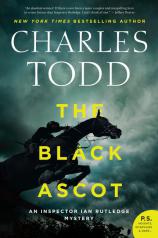The Black Ascot: An Inspector Ian Rutledge Mystery
Review
The Black Ascot: An Inspector Ian Rutledge Mystery
I have been reading and admiring Charles Todd's Inspector Ian Rutledge series since the beginning, which now numbers 21 with the release of THE BLACK ASCOT. You may think you know Ian Rutledge by this point. A brilliant detective who has been compared to the best of them all, Sherlock Holmes, he also represents the masses of soldiers who returned from war suffering from some form of PTSD. Readers will be surprised to find out more about this deeply layered character than any of the prior novels have revealed.
It's no secret that Rutledge's PTSD is evident, even though the term had not been coined during the World War I era that he witnessed from the front lines. The direct manifestation of his PTSD is Hamish, the specter of a soldier he had been forced to execute during the war. Only Rutledge can see Hamish, and he probably has deeper and more meaningful conversations with him than he has with any living soul. Does this also make him schizophrenic? No. It’s just another facet of the extremely complex character Todd has created.
"THE BLACK ASCOT is a fever dream of a novel, one in which you will feel for the sanity of Rutledge like never before.... Here is another winner in this stellar series and the most impressive and deeply personal case of Rutledge's career to date."
THE BLACK ASCOT has a dark, haunting feel to it that is exemplified by Rutledge’s apparent suicide attempt. The backstory begins in 1910 during the Black Ascot horse race that is run in honor of the late King Edward VII. It is during this event that the proceedings are overshadowed by a murder --- a brutal crime allegedly committed by Alan Barrington, who has eluded the law ever since.
Nearly 11 years have passed without Barrington being brought to justice. There are just as many rumors of his death as there are references to his living under an assumed name in an undisclosed location. What gets Rutledge involved in this cold case is a chance meeting with a man whose life he saves while traveling through a small town. This individual is an ex-con who graciously repays Rutledge's act of bravery by letting him know about the existence of the long-sought-after Barrington. Scotland Yard is not keen on reopening the case, nor do they want the press to learn that they may be looking into one of their recent failures.
As a result, Rutledge is asked to very quietly and nonchalantly conduct an investigation into the possible whereabouts of Barrington, with the overall goal of finally catching him. Rutledge does just that, and the reopening of old wounds shortly follows him in his wake. Supposedly, the last words uttered by Blanche Fletcher-Munro, the victim of the Black Ascot murder, were “Forgive me, Mark.” He must figure out what that means and who Mark is.
Rutledge turns his attention to Mark Thorne, who may or may not be the mysterious Mark. He also questions those who were close to Barrington, from his attorney to driver to former housekeepers. He gets deeper and deeper into the labyrinth of people and hidden truths, and it makes his own psyche begin to spin wildly out of control. At the precipice is a moment when he is shot at --- either by his own hand or some apparition he thought he saw just prior to things going black.
Among those who tend to Rutledge is Melinda Crawford, an old friend and a direct tie to the other successful Charles Todd series that features her daughter, Bess Crawford. Rutledge insists that it was not his intent to commit suicide, but more the end result of someone who was severely stressed and overworked. Meanwhile, he begins slowly reinserting himself into the Barrington investigation, even though his superiors at Scotland Yard have lost nearly all faith in him and are quite angered that this case has found its way back into the papers as a major story.
THE BLACK ASCOT is a fever dream of a novel, one in which you will feel for the sanity of Rutledge like never before. Solving this crime, even if it brings about his resignation from Scotland Yard, becomes a moral imperative, and readers will be amazed by how things eventually get resolved. Here is another winner in this stellar series and the most impressive and deeply personal case of Rutledge's career to date.
Reviewed by Ray Palen on February 8, 2019
The Black Ascot: An Inspector Ian Rutledge Mystery
- Publication Date: January 7, 2020
- Genres: Fiction, Historical Fiction, Historical Mystery, Mystery
- Paperback: 368 pages
- Publisher: William Morrow Paperbacks
- ISBN-10: 0062678752
- ISBN-13: 9780062678751




